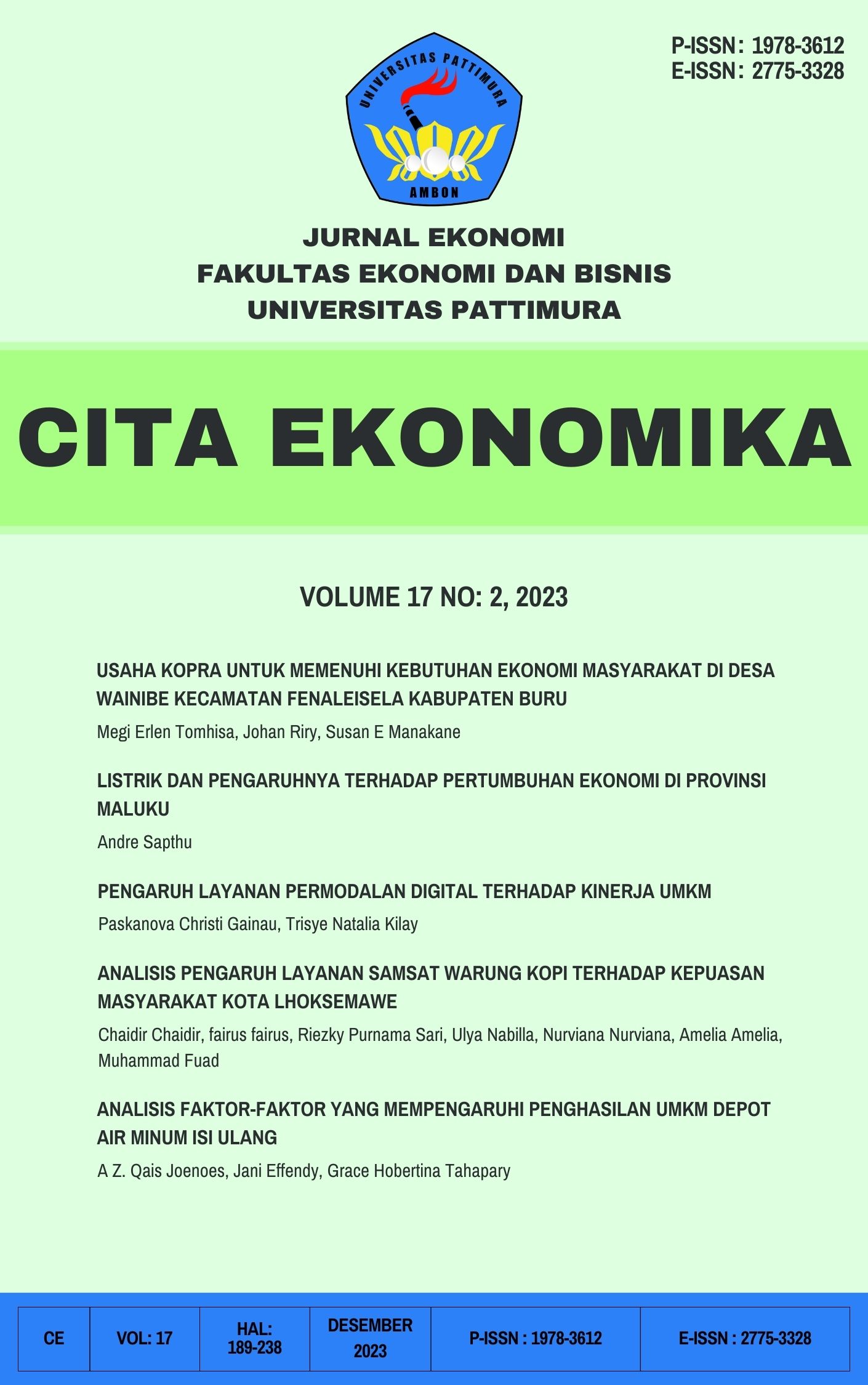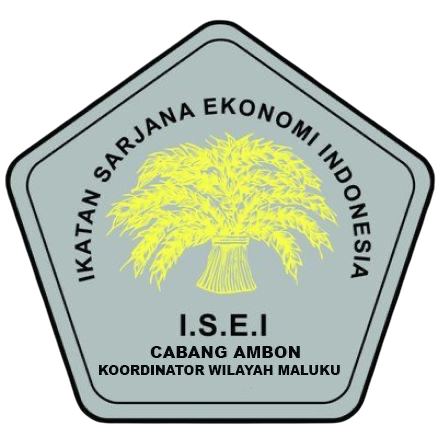PENGARUH LAYANAN PERMODALAN DIGITAL TERHADAP KINERJA UMKM
The Influence of Digital Capital Services on MSME Performance
Abstract
The aim of this research is to examine the influence of digital capital services represented by market aggregator variables on MSME performance. Market aggregator examines the aspect of access to information related to capital for business actors. The research used a survey method through observation and distributing questionnaires to business actors in Ambon City. Samples were taken based on purposive sampling technique. The research results show that digital capital services can significantly boost the performance of MSMEs. Business actors who utilize market aggregator platforms to access capital information encourage them to obtain quality information related to capital decision making so that ultimately it supports business actors to achieve satisfactory business performance. These results also have an impact on the economic sector in general, where when business actors gain access to adequate capital, sales and profit levels can increase. If sales and profits increase then in the long term the business level can increase to the next level. Increasing the level of business certainly encourages an increase in state revenues through taxes, employment, and an increase in gross domestic product (GDP).
Downloads
References
Agboola, O., Adelugba, I. A., & Eze, B. U. (2023). Effect of Financial Technology on the Survival of Micro-Enterprises. International Journal of Entrepreneurial Knowledge, 11(1), 1–13. https://doi.org/10.37335/ijek.v11i1.188
Ardiansyah, T. (2019). Model Financial Dan Teknologi (Fintech) Membantu Permasalahan Modal Wirausaha UMKM Di Indonesia. Majalah Ilmiah Bijak, 16(2), 158–166. https://doi.org/10.31334/bijak.v16i2.518
Atarwarman, R., Gainau, P., & Muriany, W. N. C. (2023). Pengaruh Financial Technology Terhadap Inklusi Keuangan UMKM Pengguna QRIS. Jurnal Akuntansi Kontemporer, 15(2), 143–154. https://doi.org/10.33508/jako.v15i3.4545
Badwan, N., & Awad, A. (2022). The Impact of Financial Technological Advancement (FinTech) on the Economic Growth: Evidence from Palestine. Asian Journal of Economics, Business and Accounting, September, 50–65. https://doi.org/10.9734/ajeba/2022/v22i2330736
Bank Indonesia. (2016). Elektronifikasi. https://www.bi.go.id/id/fungsi-utama/sistem-pembayaran/ritel/elektronifikasi/default.aspx. Diakses pada 29 Juli 2023.
Ferdinandus, S. J., & Muspida. (2022). Kinerja Usaha Mikro Kecil Dan Menengah Di Kota Ambon Berdasarkan Literasi Keuangan. Jurnal Ekonomi Dan Bisnis, 2(2), 477–483.
Fidan, Ilayda Isabetli; Guz, T. (2023). FinTech Investment and GDP Relationship: An Empirical Study for High Income Countries. İzmir İktisat Dergisi, 38(1), 215–232. https://doi.org/10.24988/ije.1108674
Kamsidah. (2022). Optimalkan Potensi UMKM terhadap PDB Indonesia melalui Lelang UMKM. Kementerian Keuangan RI. https://www.djkn.kemenkeu.go.id/kpknl-semarang/baca-artikel/15395/Optimalkan-Potensi-UMKM-terhadap-PDB-Indonesia-melalui-Lelang-UMKM. Diakses pada 15 November 2023.
Limna, P., Kraiwanit, T., & Siripipatthanaku, S. (2022). The Growing Trend of Digital Economy: A Review Article. International Journal of Computing Sciences Research, 1(1), 1–12. https://doi.org/10.25147/ijcsr.2017.001.1.106
Muhamad, N. (2023). Usaha Mikro Tetap Merajai UMKM, Berapa Jumlahnya? Katadata Media Network. https://databoks.katadata.co.id/datapublish/2023/10/13/usaha-mikro-tetap-merajai-umkm-berapa-jumlahnya. Diakses pada 20 November 2023.
Nugroho, A. P. (2023). Qualitative Investigation: Exploring the Challenges Faced by Indonesian SMEs in Accessing Financial Services in Sukabumi City. West Science Interdisciplinary Studies, 1(05), 41–50. https://doi.org/10.58812/wsis.v1i05.72
Octavina, L. A., & Rita, M. R. (2021). Digitalisasi umkm, literasi keuangan, dan kinerja keuangan : Studi pada masa pandemi Covid-19. STIE Perbanas Press 2021, 11, 73–92. https://doi.org/10.14414/jbb.v11i1.2552
Peraturan Pemerintah RI. (2008). Undang-Undang Republik Indonesia Nomor 20 Tahun 2008.
Ramaseshan, B., Yip, L. S. C., & Pae, J. H. (2006). Power, satisfaction, and relationship commitment in Chinese store-tenant relationship and their impact on performance. Journal of Retailing, 82(1), 63–70. https://doi.org/10.1016/j.jretai.2005.11.004
Sanistasya, P. A., Raharjo, K., & Iqbal, M. (2019). The Effect of Financial Literacy and Financial Inclusion on Small Enterprises Performance in East Kalimantan. Jurnal Economia, 15(1), 48–59. https://doi.org/10.21831/economia.v15i1.23192
Siswati, E., & Pudjowati, J. (2021). Faktor-Faktor Yang Menghambat Pertumbuhan Usaha. Jurnal Ilmu Manajemen Dan Akuntansi, 9(1), 1–6.
Yulianto, M. A., & Rita, M. R. (2021). Mediasi Perilaku Pengelolaan Keuangan Dalam Pengaruh Fintech Dan Literasi Keuangan Terhadap Kinerja Usaha. Ekuitas: Jurnal Ekonomi Dan Keuangan, 158, 212–232. https://doi.org/10.24034/j25485024.y2023.v7.i2.5260.
Copyright (c) 2023 Jurnal Cita Ekonomika

This work is licensed under a Creative Commons Attribution-NonCommercial 4.0 International License.











